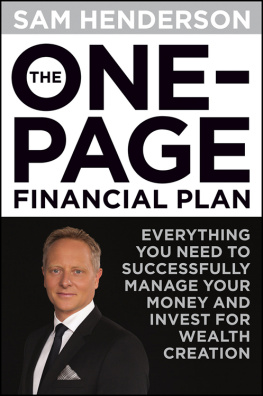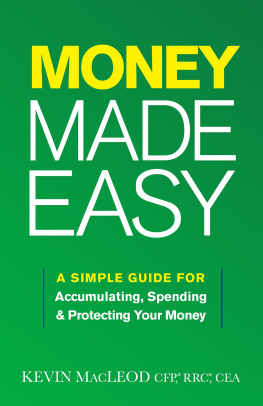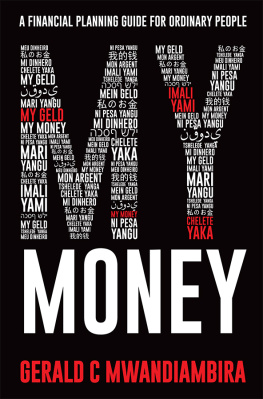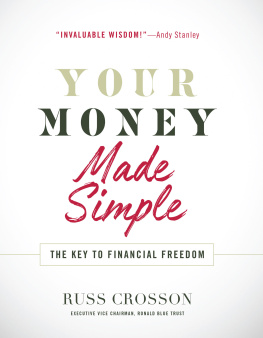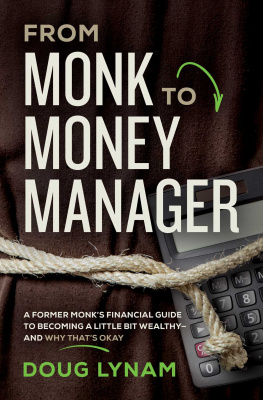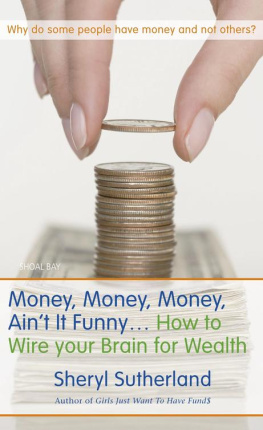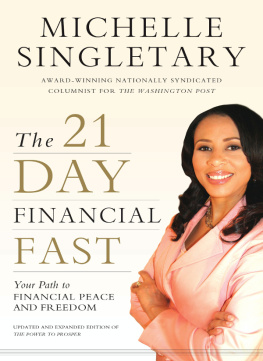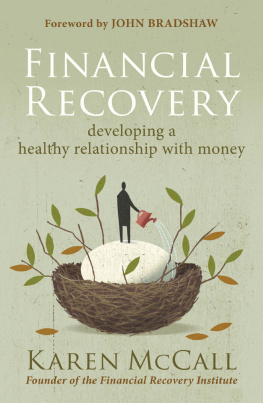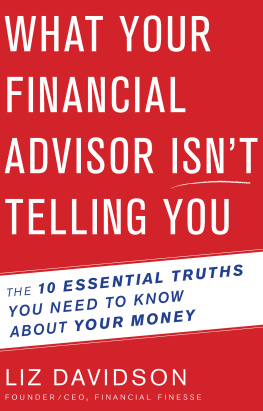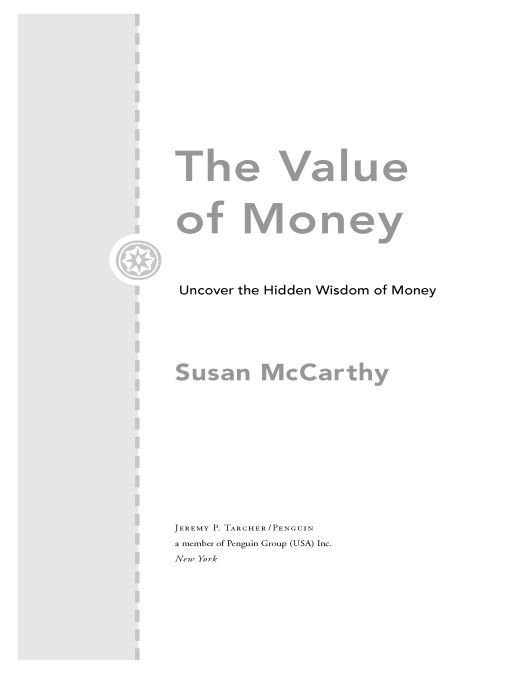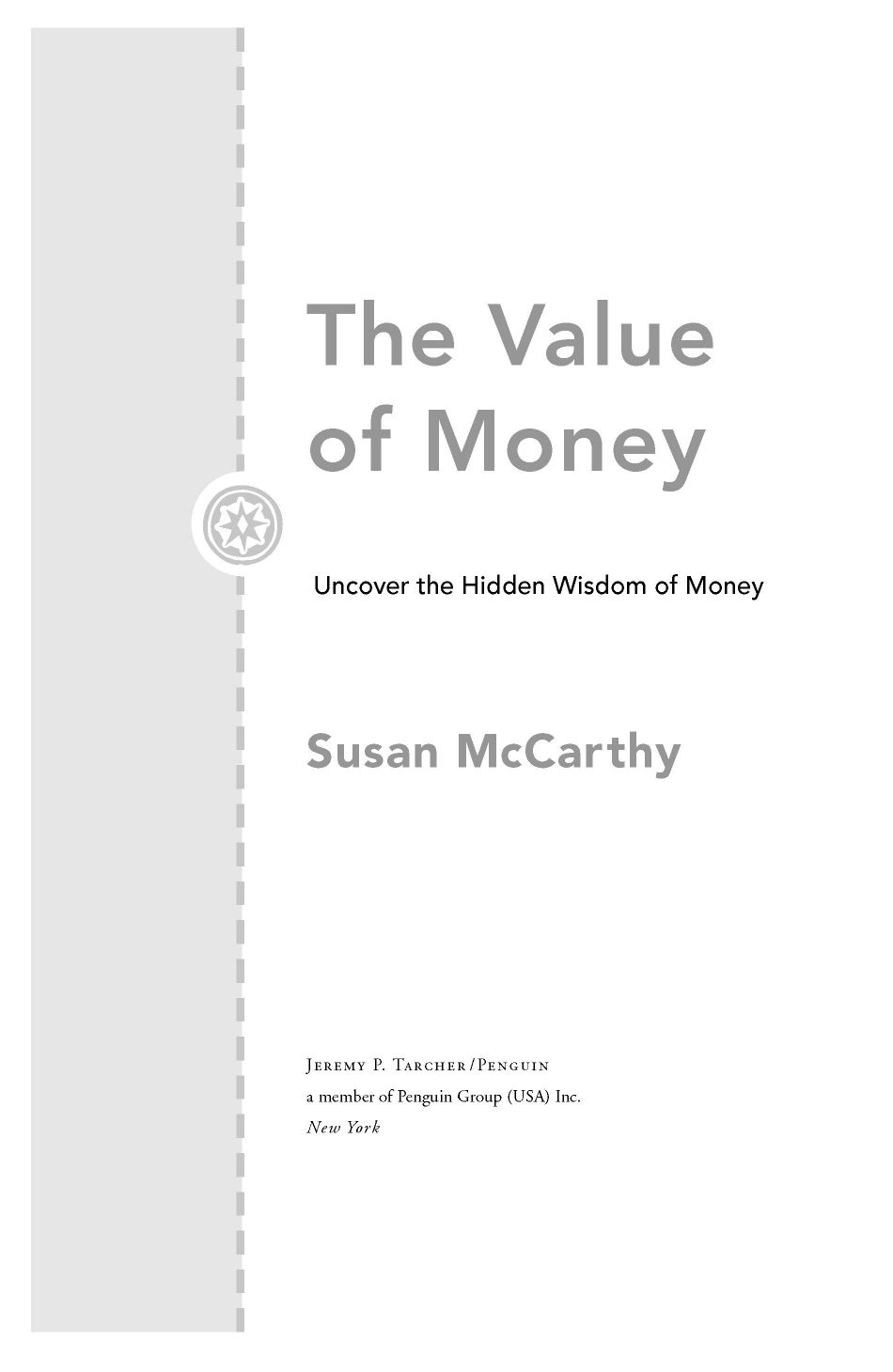Table of Contents
To Veronica and Michael,
the loves of my life
AUTHORS NOTE
In the business of handling other peoples money, confidentiality is of extreme importance. The stories told in this book, as well as the characters that play roles in them, are composites drawn from the lives of many different clients with whom Ive worked. Although I have, of course, concealed the identity of my clients, and thus fictionalized specific details of their stories, I have not concealed the tone nor true nature of our work together.
Wachovia Corporation and its entities are not liable or responsible for any and all information contained in this book. Opinions expressed are solely those of the author.
This book offers general information regarding personal, financial, and retirement planning. It cannot address all specific individual situations and therefore is not intended as financial advice. Consult with a qualified adviser regarding your specific situation.
It is not the intent of the author to offer tax advice. Consult with a qualified tax adviser regarding your specific situation.
It is not the intent of the author to offer estate-planning advice. Consult with a qualified estate planner/legal expert regarding your specific situation.
With all investments or investment strategies discussed in this book, past performance is not a guarantee of future results.
I.
The Potential of Money
Wall Street was the last place I ever expected to find grace. It wasnt a spiritual path that I had in mind when I began my work as a financial adviser. But here in the midst of stocks and bonds, PE ratios, competition, and money, money, money, I have discovered a world of deep human connection and a vast opportunity for personal growth. What I have learned is that the world of money is one of emotion, a stage on which we play out all of our dramas and, as such, that it can be an unexpected source of spiritual lessons. Most of us think of greed and jealousy at the mention of money and emotion, but there is as much room for compassion and grace in the world of money as there is in any aspect of our lives.
For over two decades I have served as a financial adviser with two major global financial services firms. My clients include institutions, families, and individuals, with different goals and varying needs. I work with money that must care for the poor, educate the young, secure retirements, run organizations, provide income, or simply grow. And, like all serious financial advisers, I work with complicated financial strategies as well as with capital markets from around the world. I am the liaison between my clients and their investments, the face of Wall Street for those whom I serve.
This all sounds quite grand. Indeed, its this sophisticated, business-oriented view of our work that most financial advisers like to hold. And, for the most part, its true. But theres another side to this world of money and investments, a side that is tangled up with human emotion. Its the side that involves the intricacies of the investments less than the intricacies of the investors themselves and especially investors in the midst of financial decision making: the ways, for example, in which fear can be a greater stumbling block to financial success than anything going on in the markets. Or the ways in which a person filled with anger can use money as a powerful weapon. Or the ways in which a self-destructive person can use money to sabotage him or herself. Ive been both surprised and gratified by the number of times Ive been involved with my clients as they work out some of the common but thorny emotional issues that life and money together present. This is a side of money management that is never far from the surface and that affects every part of life. Its an aspect of the money business too long ignored by those who advise people on financial decisions, but its well known to all who make them.
The Dilemma of Putting the Emotion Back into Money Management
From the outside, the world of money seems to be a mixture of complicated strategies, global influences, power brokers, and dumb luck. The investment world presents a dizzying array of choices. From the outside, there often appears to be little consensus on the direction of the markets among those who purport to know, often leaving investors confused by conflicting advice. Its no wonder that many people are nervous when faced with major financial decisions or just investing in general.
Theres far more involved in managing money, however, than what fills the financial news each day. For most of us, dealing with our money, especially making decisions at important junctures in our lives, is an unexpected tangle of the highly quantifiable and the purely subjective. Making financial decisions and managing our money are as much about understanding our fears, strengths, and weaknesses as about understanding how investments work. Beneath the quantitative, masculine, and analytical skin of money management, there beats a heart of raw emotion.
I believe that most of us understand this on some level. We know that our relationship to money is emotional. If youve ever had to make any one of a number of major financial decisions investing retirement money, taking over the care of an elderly parent, receiving an inheritance, to name just threeyou know that your decisions can be governed as much by knee-jerk emotional reactions as by any financial concerns or market conditions. The truth is that money and emotion go hand in hand.
Many people in the investment world feel that in order to be financially successful we must set aside our emotions. But I disagree. I believe you must acknowledge your emotions and study how they relate to your money. To make the best possible financial decisions, you must understand your relationship to money. Theres great power in this understanding, great potential for freedom and growth. Its a simple tool, this money, but its everywhere in our lives, a current that flows through every relationship we have, many of the decisions we make, and every generation. It may be a simple tool, but its also one of our most accessible and powerful tools for growth and change. The challenge is to see it as such.
How I Learned That Money and Emotion Are Inextricably Linked
In my early years of working with people and their money, I was mostly concerned with building a practice and learning all I could about the intricacies of investing. My focus was on money because, of course, that was where I believed it needed to be. I perceived my most important contribution to my clients lives to be my knowledge of investments and how to apply them to an individuals personal situation. And, of course, thats still my responsibility. Its still what people come to me for and a responsibility I take very seriously.
But on one extraordinary day, I was given an unusual opportunity to glimpse a more important aspect of my work. This was the day my eyes were opened to the real key to understanding money and to the huge potential that this understanding could offer. Weve all experienced those odd coincidences in life that prove to be important turning points. Mine came on that one day in an odd juxtaposition of client situations that was so striking, I could hardly miss it.
It began on the day before Thanksgiving many years ago. One of my favorite clients called me early in the morning at home and, with great excitement in his voice, asked me to meet him at the office as soon as possible. He had recently negotiated the sale of his business. After what must have felt like years to him, he was, at last, holding a check for several million dollars.


